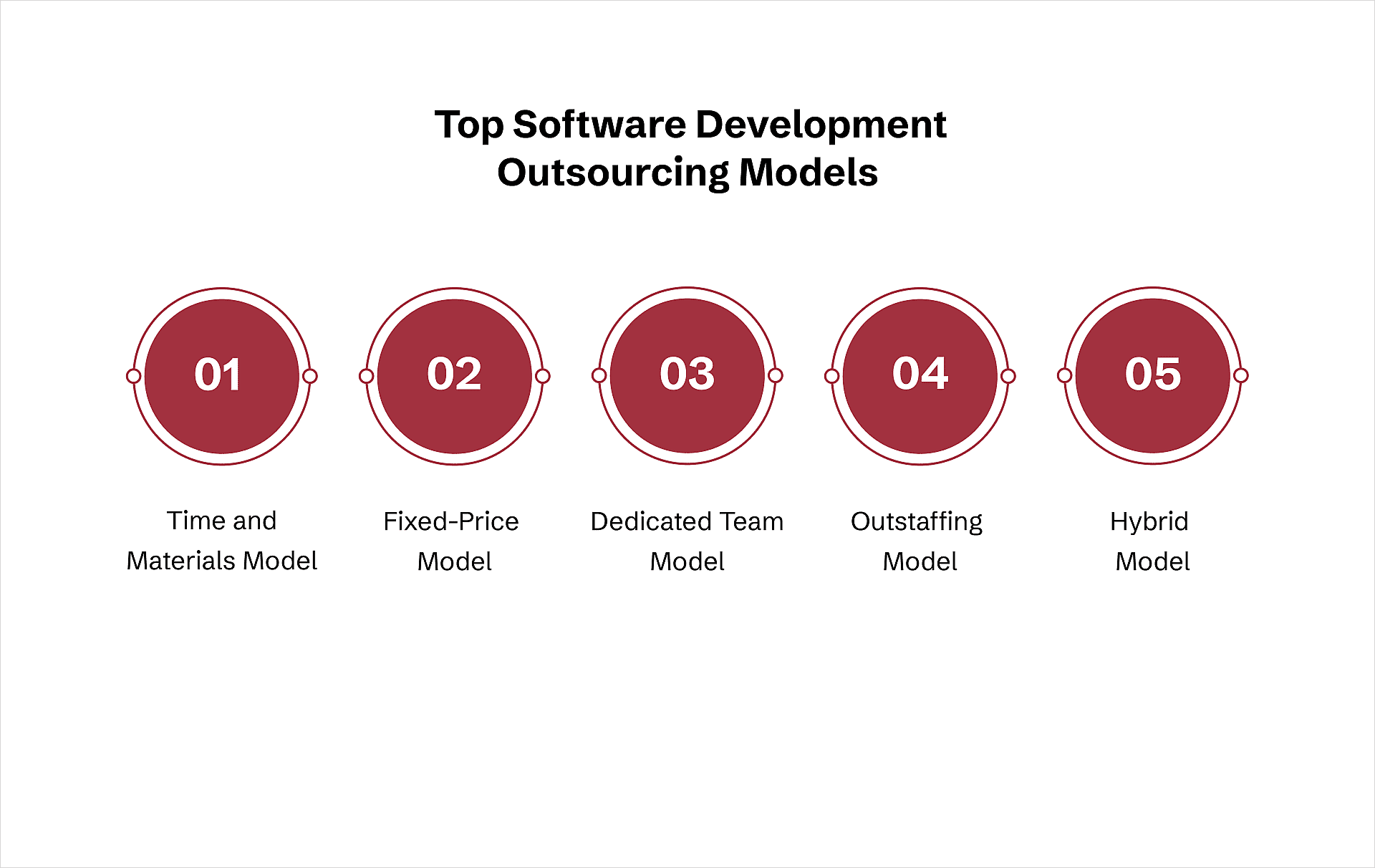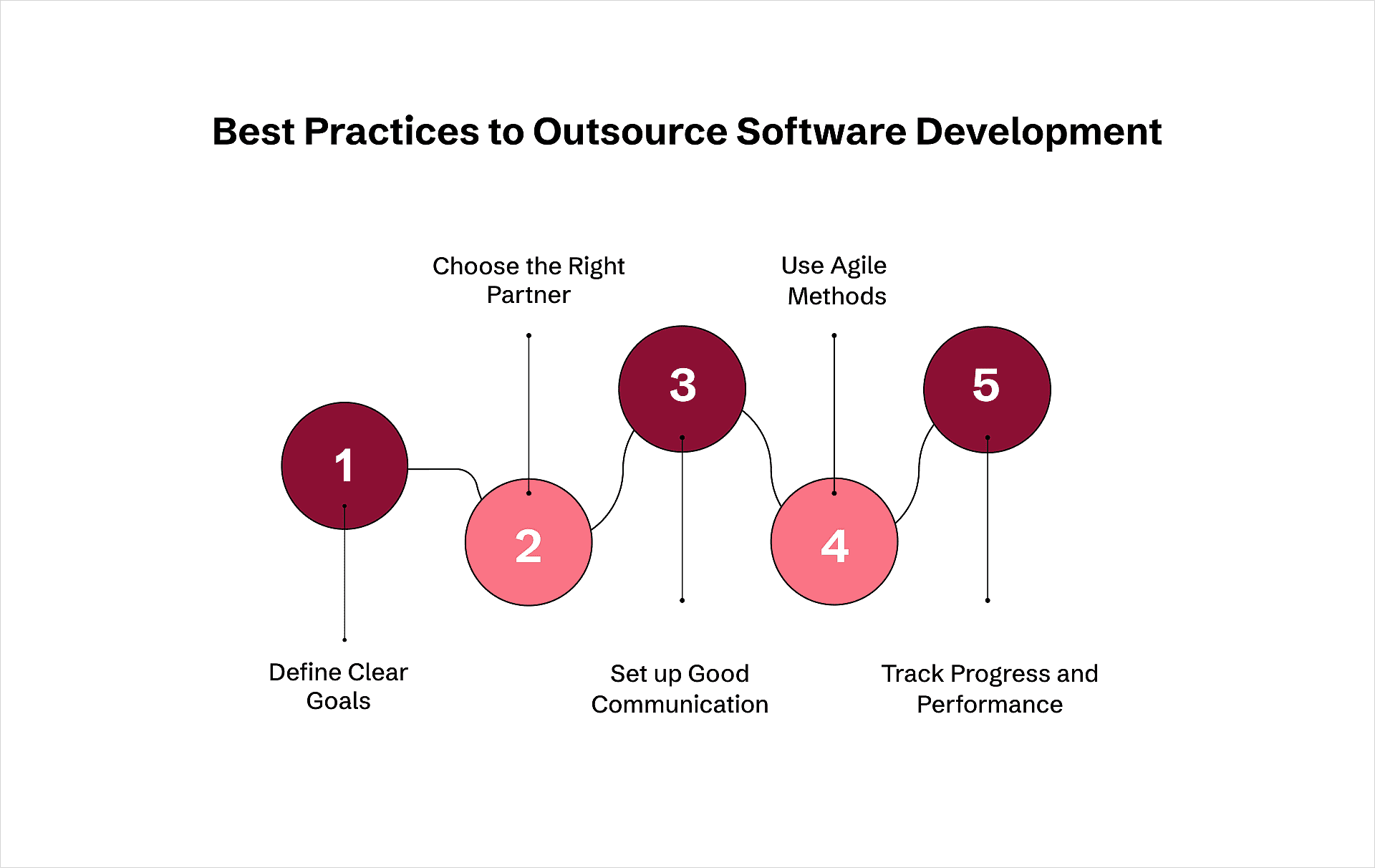
- What is Outsourcing Software Development?
- Types of Outsourcing Software Development
- Top Software Development Outsourcing Models
- Pros and Cons of Outsourcing Software Development
- Importance of Software Development Outsourcing
- Strategic Choices: In-House vs. Outsourcing for Software Development
- Influencing Software Development Outsourcing Trends
- How to Outsource Software Development?- Best Practices to Follow
- Top Outsourcing Software Development Examples: Case Studies to Refer
- Best Countries to Outsource Software Development Projects
- Wrapping up

Outsourcing software development is not a new trend; several top brands like Slack, Skype, and WhatsApp have tapped its potential to become successful. There are several advantages attached to this practice that made it one of the fastest-growing software development trends in existence. For instance, the ability to fill the talent gap, utilize practical experience and upscale the product quality.
Modern entrepreneurs and business owners are choosing to outsource their projects to software development companies as well. This is triggering unprecedented growth in the industry. A Statista report suggests that IT outsourcing revenue globally is expected to reach $541 in 2024, followed by a CAGR of 8.48% between 2024 and 2029. Several benefits contribute to the rise in the popularity of outsourcing software development.
What is Outsourcing Software Development?
Outsourcing software development refers to hiring Software Development Companies or independent teams to build software. One key benefit of outsourcing software development is the increased effectiveness and reduced risk it offers. By partnering with experienced software development teams, businesses can ensure their software is developed efficiently and effectively.
This reduces the risk of costly errors or delays. It can also provide security and confidence in the development process. However, in addition to offering many other advantages, outsourcing software engineering helps many businesses fill talent shortfalls.
The popularity of outsourcing boosted in the 1980s and '90s. Since then, the trend has significantly increased. We must dive deeper into the types to understand how outsourcing software development works.
Types of Outsourcing Software Development
The outsourcing custom software development industry is divided into different segments based on the requirements of the clients. These categories take locations, project size, costs, and more such factors into consideration.

Offshore Outsourcing
Hiring an offshore software developer or a development company means hiring them from different locations. Offshore outsourcing is done for many reasons. For instance, to optimize and build products for specific markets, reduce software development costs, and more.
Nearshore Outsourcing
As the name suggests, nearshore software development outsourcing refers to hiring companies from nearby countries. Benefits of outsourcing to nearby countries include reduced travel costs, easier communication, faster turnaround times, and better transparency. Apart from software development, nearshore outsourcing trends are also used for customer support, software upgrades, and more.
Onshore Outsourcing
When a software development service provider is hired within the same country, it’s called onshore outsourcing. The benefits of outsourcing software development in the same country include legal protection, easier access, better control, and more involvement in the project.
Freelance Outsourcing
Outsourcing custom software development to freelancers is also an option service seekers prefer. Freelance outsourcing is great for projects that are short in nature. Freelance outsourcing is cost-effective and offers flexibility.
However, it can be a little unreliable regarding quality, meeting delivery deadlines, and proper management. There are several freelancing websites in existence to bridge the gap between freelance service providers and clients.
Managed Services
Outsourcing managed services refers to outsourcing project management. These services are preferred if service seekers do not want to get involved actively in the development process. Outsourcing services to external management helps access expertise, predict overall software development costs, build software within the promised timeline, and more.
Staff Augmentation
Here, hired software development companies deploy teams of development experts on clients’ locations. Some businesses might already have internal development teams. Such service seekers prefer staff augmentation to scale up their teams for specific projects.
However, staff augmentation can come with its own challenges. For instance, poor internal collaboration, limited commitment, and possible integration hurdles.
Project-based Outsourcing
Businesses prefer outsourcing for specific projects involved in the development strategy as well. Project-based outsourcing is done for specific requirements. Like upgrading an app, optimizing the app for app stores, and more. Project-based outsourcing is done to fill skill gaps that exist in the development process.
Top Software Development Outsourcing Models
Several software development outsourcing models help service providers and clients form productive collaborations. These briefs can help you understand each model better-

Time and Materials Model
Clients who choose to outsource software development under the Time and Materials model pay for the time and resources used. This model is highly flexible and can be great for projects with changing requirements. Software development companies charge based on the hours that go into the project. The cost involved in this process can be unpredictable. The model also requires better transparency to ensure development hours are honestly measured.
Fixed-Price Model
This model eliminates the chance of unpredictable costs. Clients decide on a specific cost to outsource software development under this mode. For well-defined projects, the fixed-price model is the best bet. Now, if development requirements change in between, the Fixed-price model can become a hurdle.
Dedicated Team Model
The dedicated team model extends to the clients’ already existing teams of development experts. Service providers allocate a dedicated team for better transparency and commitment to the project. Having a dedicated team offers stability and aligns the workload efficiently. It also keeps the development process free from distractions caused by other projects going on in parallel.
Outstaffing Model
Clients manage teams working on the project themselves. An outstaffing provider connects the client and the team. Clients gain transparency over success, control over work management, and more. Outstaffing is a flexible model but requires good oversight from the client for a smoother development process.
Hybrid Model
Here, characteristics of multiple models are applied. Clients can avail themselves of fixed-priced models for some development processes, while time and materials models are available for other parts.
This provides better customization by balancing the predictability and adaptability of the process. However, Hybrid models require careful consideration and implementation of these models to ensure each stage of the development is carefully planned.
Pros and Cons of Outsourcing Software Development
Outsourcing software development pros and cons are equally important to consider while you are deciding on a development model for yourself. Comparing pros and cons makes it clear whether outsourcing is the best strategy for the required software development or not.
| Pros | Cons |
|---|---|
| Lower labor costs in some countries | Time zone differences can delay feedback |
| No need for expensive equipment | Language barriers can cause confusion |
| Access to specialized talent | Quality may vary between providers |
| Bring in experts for specific tasks | Harder to oversee work directly |
| Scale team size up or down quickly | Risk of data breaches |
| Handle unexpected workload spikes | Intellectual property theft |
| Free up internal resources | Extra fees for changes |
| Focus on strategic priorities | Travel and oversight costs |
| Accelerated development process | Different work ethics |
| Continuous development cycles | Misaligned expectations |
Importance of Software Development Outsourcing

Outsourcing software development is crucial in today's business landscape. It offers cost-efficient access to a global talent pool and enables companies to focus on their core competencies. Let’s dive deeper to understand how software development outsourcing is important.
Access to a Global Talent Pool
Choosing to outsource software development gives access to a global talent pool. Depending on the company, clients can find development experts with diverse backgrounds. These experts can provide access to a large pool of talent, experience, resources, and research data. Ultimately, these factors help improve the quality of the development strategy.
Cost Efficiency
Outsourcing custom software development can reduce costs, especially if clients' local markets are costlier. For instance, a US-based client can hire software development companies in India at cheaper rates due to factors such as lower inflation, higher competition, and more.
Faster Time to Market
Outsourcing enables access to teams in different geographical locations and time zones. This helps work continue even when the client is inactive. Software development companies can also speed up the development process by allocating more resources. This helps to keep the development process continuing around the clock.
Scalability and Flexibility
Outsourcing can help handle spiked workloads well. Most software development companies follow the practice of keeping resources as backups. This helps them allocate more human power or optimize the development strategy if project requirements change.
Focus on Core Business Functions
The important goal of outsourcing is to prioritize business operations. Clients can focus on more core business functions that require their attention by choosing to outsource software development. Freeing up internal resources such as staff also helps optimize them for operations requiring more urgent attention.
Strategic Choices: In-House vs. Outsourcing for Software Development
| Aspect | In-House Development | Outsourcing Development |
|---|---|---|
| Cost | Higher initial costs for hiring and infrastructure | Lower initial costs but potential hidden expenses |
| Talent Access | Limited to local talent | Access to the global talent pool |
| Control | Full control over the development process | Limited control over external team |
| Quality | Easier to maintain consistent quality | Quality may vary depending on the provider |
| Scalability | Limited by internal resources | Easy to scale up or down quickly |
| Time to Market | Dependent on internal resources and processes | Faster due to continuous development and expertise |
| Focus | Potentially distracted by other internal responsibilities | Allows focus on core business functions |
| Communication | Easier with face-to-face interaction | Potential issues due to time zones and language barriers |
| Security | Easier to maintain data security | Potential risks of data breaches or IP theft |
| Cultural Fit | Aligned with company culture | Potential cultural differences and misaligned expectations |
Influencing Software Development Outsourcing Trends
The rising advantages of outsourcing software development are impacting trends globally. Some stats can help dive into this growth better. Let’s have a look-
Rise of the Hybrid and Remote Workforce
The global outsourcing market is rising rapidly and is estimated to reach approximately $525.5 billion by 2030. According to Grand View Research, the market is expected to rise between 2023 and 2030 at a CAGR of 9.4%.
Increased Focus on Cybersecurity Concerns
While outsourcing, the cybersecurity and privacy of the project become clients' major concerns. This is contributing to the rising cybersecurity expenditures around the world. The global cybersecurity market is expected to rise at a CAGR of 9.4% between 2023 and 2028, reaching an approximate worth of $298.5 by the end of the period.
Rising Popularity of DevOps Services
The rising popularity of software development outsourcing models is pushing the popularity of devops services. Companies can adopt continuous integration and continuous delivery (CI/CD) pipelines. These services help businesses streamline their software development lifecycle, enhancing efficiency and reducing time to market.
Extension of IoT-integration
The rapidly growing IoT market establishes unique competition in the software development industry. According to Statista, in 2023, the projected IoT spending globally was $1.1 trillion. Clients outsource software development to leverage this technology without hiring dedicated IoT engineers.
Rapid Expansion of AI and Machine Learning
Technologies such as artificial intelligence and machine learning are why outsourcing software development is rising in popularity. Clients leverage expertise offered by external service providers without looking for dedicated talents. This reduces overall development time, keeps ROIs on track, and helps build high-quality software.
Rising Demand for AR/VR Development
Augmented and Virtual Reality technologies enable an immersive experience that influences software development outsourcing trends. Clients are looking for experts who have expertise in building and delivering immersive interactive experiences. The technology is preferred by major industries such as e-commerce, weather, education, and more.
How to Outsource Software Development?- Best Practices to Follow
The process of finding software development outsourcing partners requires a colorful planning of practices to follow. These practices are focused on several stages of outsourcing, such as listing goals, choosing a company, and more.

Define Clear Goals
Having a clear overview of goals is critical to maximizing the ROI of an outsourced software development strategy. Software goals should cover the kind of engagement expected, milestones for each stage of the development cycle, KPIs, and more.
Curating goals can help build quality software. Your goals can also help you choose the best method, in-house vs. Outsourcing, for Software Development.
Choose the Right Partner
The selection of the right development partner should be carefully made for a smoother development process and maximum ROI. Several filters, such as budget, past clients, ROIs of past projects can help. It is also ideal to take work culture, transparency standards, post-development support, locations, and more into consideration as well while making the decision.
Set Up Good Communication
Having clear communication is the key to successful outsourcing. Set up a proper communication channel. There are several project management tools and employee management software in the market to help with the same. Some of these tools include popular names such as Slack, Jira, etc.
Use Agile Methods
Agile implements a flexible development strategy. This ensures that developers can adjust the process and be more collaborative based on feedback and QA results. Setting up an agile framework helps ensure the client team and the outsourcing provider are aligned on the agile processes. Using agile methods helps ensure the project delivers value and adapts to evolving business needs.
Track Progress and Performance
Implementing methods such as automated testing and manual testing can help you keep software performance in check and provide insight into its growth. Implementing a strategy that includes any of these testing procedures helps keep software health in check and get the best quality software built.
Top Outsourcing Software Development Examples: Case Studies to Refer
Several reputable software are built by outsourcing their development process. WhatsApp, Skype, Slack, and Basecamp are some of the top outsourcing software development examples. Some of these examples are discussed further.

Case Study 1: Slack
Project- A user-friendly communication platform for teams.
Summary- Slack outsourced the development of its communication tool to a Canadian software development company, MetaLab. The company helped Slack build one of the most popular business communication platforms. At the moment, it has over 10 million daily active users.
Case Study 2: Basecamp
Project- A leading project management tool.
Summary- Basecamp outsourced the software development project to a team of remote developers. The company is renowned for its remote-first culture, which leverages outsourcing to access top talent. At the moment, it has millions of users around the world.
Case Study 3: Skype
Project- Development of a professional VoIP communication platform.
Summary- Skype outsourced the development of its product to an Estonian trio. This helped Skype achieve global success as a leading VoIP provider. Microsoft acquired Skype in 2011 for $8.5 billion, highlighting the success of its outsourced development strategy.
Best Countries to Outsource Software Development Projects
Several countries are popular as outsourcing software development destinations. These countries offer a strong tech ecosystem, skilled workforce, and competitive development costs. Here are some of the best countries for outsourcing software development projects. Let’s have a look!

India
Software development companies in India offer one of the most diverse ecosystems. The country's cultural diversity and abundance of tech talent make it an attractive and competitive market.
Outsourcing software development to India is cost-effective due to the competitive rates offered by Indian companies. On average, Indian software development companies charge $20 to $50 per hour.
The USA
The country is known for its quality of services, strict development regulations, user-friendly innovations, and more. However, the country can be an expensive destination for outsourcing custom software development projects.
As for the leverage, it offers a talent pool from different corners of the world. Clients looking for a diverse team with several skill sets and backgrounds can go for software development companies in New York, Boston, and other corners of the country. The average development cost in the USA can fall between $100 to $250 per hour.
The UK
Clients consider the UK among the top options whenever questions such as where to outsource software development arise. The country offers a competitive development landscape in Europe.
Some other advantages offered by software development companies in the UK can be high technical expertise, cultural compatibility, strong infrastructure, and proximity to major markets in Europe and North America. The average cost of software development outsourcing to the UK can be $50 to $150 per hour.
Wrapping up
Outsourcing software development is the need of the hour, especially if development projects are not repetitive. Clients looking forward to upscaling their ROIs smartly can find external talents to contribute to product growth. Such advantages are fueling the growth of the outsourcing custom software development industry.
A Precedence Research Report focuses on this growth. As per the report, the industry is expected to grow at a CAGR of 8.2% between 2023 to 2032. For businesses and entrepreneurs that have no dedicated resources or expertise in building successful software, a perfect strategy to outsource software development can be the key to unlocking greater ROIs.
Frequently Asked Questions
-
What is the strategy to outsource software development projects?
-
How much does it cost to outsource software development?
-
Who can leverage the advantages of outsourcing software development projects?
-
What are the risks of outsourcing software development?
-
What are the common technologies outsourced in software development practices?
-
How do we ensure quality assurance in outsourcing software development?

















